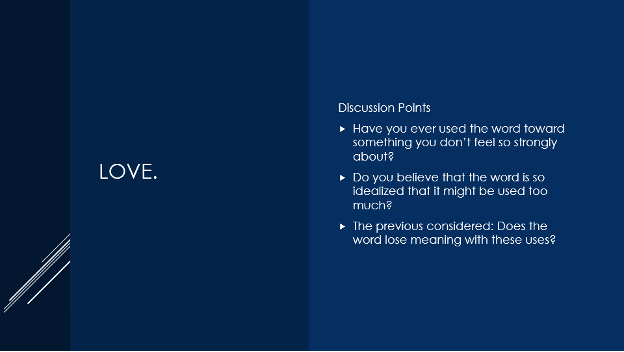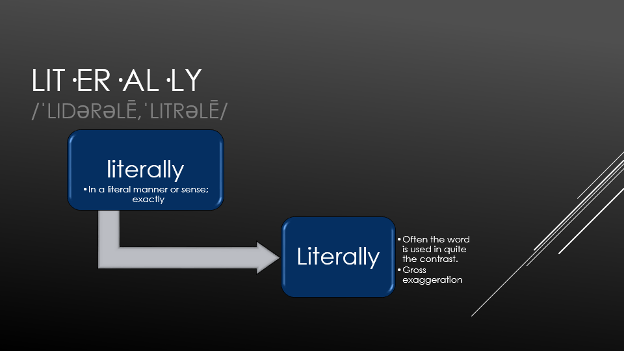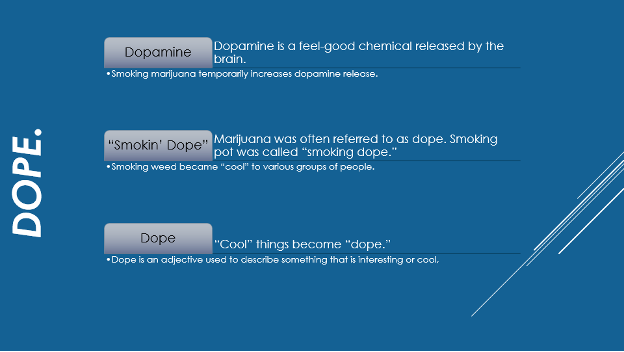Chapter 4: Convincing Discourses
4.7 When words lose meaning (argument from experience)
Manny Perez
English 102, January 2020
How often do you use the word “literally” or have seen it used in recent times? Far more than the word should be literally used. How often do you find people correcting the usage of the word? Much less than they probably should. This is just one example of how words are being taken from their denotative meanings and adapted for the sake of modern communication, and in this case to emphasize the weight of the verbs while changing the weight and meaning of the word itself. Times change, and connotation- the commonly understood meaning of a word based on context rather than literal definition- changes with it. While some words may gain more meaning and attention, some words lose their actual meaning and, in some cases, may be considered ruined. The discrepancies of connotation versus denotation often go unnoticed as the use of language is constantly being restyled for one reason or another.
I literally cannot come up with a way to give an example of how using words in a certain way to show, like, how it can be detrimental to the legit way they were intended to be used. This may be an extreme and slightly outdated example of how modern speak and understanding of words hinder meanings, but you could see how it could be wrong, right? Odds are whoever may have spoken in sentences as such would never consider putting the sentence into a paper for a class or work setting. Regardless of this, we would still commonly find the same people speaking in the same manner as the previous example, implying that this trend was tried and caught on. This further implies that these same people accepted the disfigurement of their speech and would assume the grammatical infraction as their own. To an extent these behaviors are to blame for words proper meanings to become more obsolete. Reach back to the example and think about the word “legit” for a moment. Legit– if not describing something as “legal”- stems from the word legitimate which means to justify/ to be justifiable. While, by definition, it is not different, it just shortened for the sake of direct communication. Here legit remains respectable for literary discourse, it is when you look forward that change is much more noticeable. Through improper use, the “Americanized” definition of legit has become synonymous with the word “supercalifragilisticexpialidocious.” Harboring no definitive weight, taking its denotative meaning into consideration, pairing it with a nonsensical word that was created for a family/children’s movie. Recognizing that there is an inevitability that the word will grow in usage in everyday speak, you accept that it may be a good thing for the word to grow and find ways to expand the vocabulary of more and more people. It happens and you never think twice about it. But what happens if a word suffers the same fate as legit did? The word dies back out of every casual conversation, and eventually fades out of casual writing too. If the word dies out, when it is remembered, how deep will they be able to reach? Will legit still be legitimate, or would you just say it is “awesomesauce?”
Not all these words become obsolete, some of the recycled words persist with regular use. Plenty are used with good and more positive connotation, while others, not so much. Some of these not-so-good connotations of the words can be so poor that it is much more misunderstood than is good for the community in which the word is used. A questionably indecent choice that is a great talking point, is the insult of calling someone a “pussy.” Providing background and insight should help with understanding why even with risk involved this is still a choice example. Thinking back to times when the word was beginning to be used as an informal name of a female body part, it was used as an insult to just call someone the body part, like calling someone a “dick” to insult them by calling them the male body part. The context of using the term is misconstrued with an ignorance to the fact that it is being misused. You find the insult used in the context of a person being scared or timid, a more aggressive way to call a person a coward, yet still referring to the person as the body part. Nothing about the biological function or description of the body part fits the description of “fearful and/or timid.” Think back to growing up as a kid, you would most often would hear the word and only know it when talking about a “pussycat” synonymous to scaredy cat and ‘fraidy cat. It is a fitting term when taken into consideration how easily frightened felines are, but have you stopped to wonder why it is so fitting? Pussy is short for the adjective “pusillanimous” which literally (yes, it belongs here) means to describe something as cowardly, fearful, or timid, or lacking courage. Shortening pusillanimous to pussy is no different than shortening legitimate to legit for convenience sake. The context of the usage is correct, but this is where the word loses its meaning. Association to the body part should be left out, it does not make sense to do so, and it no longer directs the insult to the person originally aimed toward, but to the body part itself. That can be harmful to society and various communities within it. If you are going to insult someone by calling them the female body part, by all means, insult them however you feel fit, it becomes no different than calling them a “dick.” Please just do not use the word in regard to the body part when someone is being cowardly, not only is it incorrect, it also makes you a part of the collapse, helping a word lose its meaning.

Love is a feeling that continues to grow in mainstream society. Often romanticized and craved, the term is spread often and far. The word is an example like its contrast, hate, the strong feeling commonly attached to the word loses it meaning when it is overused. It becomes modern lingo, perhaps an exaggeration, a slight hassle that one may claim to hate. Love just so happens to be thrown around as often. On different forms of social media these connections are formed, and “love” is found so easily, so quickly, and many never question it. The word is used often and sometimes toward things and people of whom would not provide the strong feeling originally attached to the word. I leave the discussion open with some insight (See Figure 1):
- Consider how often you use words such as these loosely.
- To what extent does one love chocolate cake? Enjoying one each week vs. Eating one or two a day
- Recognize the difference between wanting to feel “loved” vs. attention.
- Social Media often leaves people seeking attention and views as a way to feel “loved,” but the true satisfaction of love is often missed because idealistically in modern times the instant gratification should be love.
- Words lose meaning, it is inevitable, but it also gains meaning.
- Left to debate is if the word loses meaning. Does it lose its original meaning, or does the new usage open doors for common vernacular? Does death really mean death in literacy?
Figure 1 was included to provide visual representation of how looking into the backgrounds of words may ensue. Love is a topic for potential controversy so in order to understand how the word works pulling emotion and opinion away from the topic is the best option. This is meant to encourage critical thinking, to foster engaged attitudes.
In order to help visualize the processes in which words go through I composed a multimodal presentation designed to show the steps of the changes. For the sake of keeping the visuals to a reasonable presenting length, shorter stepped transitions of varieties were included. Longer examples, such as pusillanimous, were excluded in order to keep the visuals to an introduction to the topic. Included in the presentation is the word literally, which was mentioned in the first paragraph.

The step-down, flow chart method of presenting is reliable when looking at words that progress in steps, literally being a small, yet effective choice. Choosing dope was another interesting argument to make but stood its ground with its use in mainstream social media and traceable history (Figure 3). It provides more insight into what finding an in-depth history looks like. Offering an avenue like the one pusillanimous yields, it remains unique from the others. The multimodal aspect is structured to argue not if these are good or bad things, or if it does not matter at all, but rather to argue that you look at these changes. The words might not matter themselves but practicing this study is critical thinking that does not apply solely to writing but could apply to life and character development/self-development. Thinking of commonly used words would not be unusual and strengthening your mind because you wanted to know if a word was “good” or not makes this a good pair. Taking these new strategies of thinking and applying it to relevant interests in your life could make a difference academically, at work, managing life and maybe more depending on how you integrate the practice. As a young adult I do not believe that it would be out of line for me to say that that is dope.

“When Words Lose Meaning” is not debating if it happens or not. It is not about figuring out who is not to blame for it, nor is it even about if there is blame to delegate. The time when words lose meaning is not bound strictly to “connotation versus denotation,” but to all the moments that could possibly make you wonder why this is, this way? Or perhaps, why this is, this way? The focus should fall on the ways and reasons the meanings are lost. Many opinions form and choosing sides may come along but understanding where the opinions stem from is important. Finding your own take on the ever-changing literacy may seem daunting, but here you have your primary discourse at your fingertips for dissection and discussion. Knowledge is power, wisdom is knowing how to use it.

